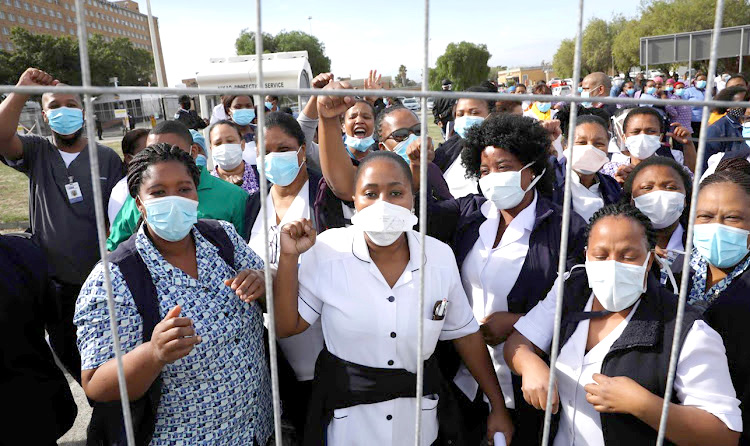
NTHABELENG, a 28-year-old nurse on the front line of South Africa’s Covid-19 pandemic, is exhausted and afraid.
Each day, she begins her shift haunted by the dread of contracting the coronavirus and dying, leaving behind a five-year-old daughter. She finishes it numb with fatigue, but the fear remains.
Every week, ‘a colleague dies’ somewhere, said Nthabeleng who works in a rural clinic in northern Limpopo.
That morning, two nurses had died at another clinic in the same province, she added.
‘We are also in the queue of dying – we are just waiting for our day,’ Nthabeleng said, her voice shrouded in despondency.
Her name, like those of other health workers in this report, has been changed due to a media blackout on reporting from hospitals.
Africa’s worst-infected country may be over the peak of a deadly second wave of coronavirus but a surge in patient numbers in recent weeks has left nurses drained.
At least 1.46 million infections have been recorded in South Africa, which accounts for 41% of the continent’s total cases. Of these, 45,000 have died.
A new, more contagious variant of the virus has fuelled the spread, and the pressure on hospitals is the worst in the country’s living memory.
Compared to most African countries, South Africa’s healthcare system is well-off, yet workers said they have battled to cope.
Gruelling 12-hour shifts, calming panicky patients and shuttling infected and non-infected patients are all part of Nthabeleng’s routine at the small clinic where only three nurses work.
‘It’s like a supermarket approach – you do everything,’ she said by phone as she nervously related her daily routine.
The fear of transmitting the virus between patients and catching it herself runs deep.
Earlier this week, South Africa took delivery of its first coronavirus vaccines – a million doses of the Oxford-AstraZeneca formula, which arrived from India.
But it will not be until mid-February before the country’s immunisation campaign begins, and it will take many months before the population of 58 million is shielded.
In the interim, ‘the situation is very bad,’ said a 27-year-old male nurse.
The rate of testing positive amongst nurses is high.
More than 35,100 medical workers had contracted the virus in South Africa’s public sector by October last year, according to Health Minister Zweli Mkhize, with more than 400 of them dying.
National Education, Health Allied Workers’ Union (Nehawu) spokesperson Khaya Xada described the numbers of workers infected and dying as ‘clandestine’.
Vacancies left by nurses who died were not being speedily filled, exacerbating the workload for those who have survived, according to another union.
‘Those who have died have not been replaced and nurses that are unemployed remain very much unemployed,’ Legato Mthunzi, the president of the Young Nurses Indaba Trade Union said.
Despite the exhaustion, many nurses vow to soldier on at the frontline.